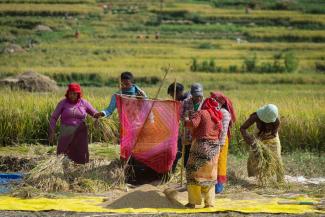Readers’ opinion
Letters to the editor
 picture alliance/ZUMAPRESS.com/Bivas Shrestha
Harvesting rice in Lalitpur, Nepal.
picture alliance/ZUMAPRESS.com/Bivas Shrestha
Harvesting rice in Lalitpur, Nepal.
Decaying rural areas
Hans Dembowski: “Integrated rural development matters more than ever“ (D+C/E+Z Digital Monthly 2023/11, editorial, p. 3)
Integrated Rural Development was a buzzword in Nepal as well – in the 1980s, as you mentioned. It is no longer the case.
The situation has worsened in preceding decades. Frequent political upheavals, together with overall economic downturn, led the majority of the rural population to urban areas for personal safety and for employment opportunities. The Maoist rebellion (from 1996 to 2006) aggravated the situation furthermore. After the 2006 truce, young men and women began leaving the country in search of employment in the labour markets of the Gulf countries and Malaysia.
The flow continues even today – with 1500 to 2000 people leaving Nepal every day. Although a majority of them send remittances and do come back for a brief respite of a couple of months, they do not return to villages to till or tend farmlands they owned (some were made landless by the Maoist rebels).
Net result: Nepal’s fertile lands and farmlands remain barren. And villages have virtually become a shelter for aged parents and grandparents. There are no government policies that give incentives to people to cultivate their lands and grow food grains and fruits. In the absence of young people, old people are dying without proper care and funerals or cremation.
Ecosystems and biodiversity
Min Qingwen and Gua Xuan: “Interplay of culture and nature“ / Interview with Melissa de Kock: “The basis of our existence“ (D+C/E+Z Digital Monthly 2023/08, p. 23 / p. 27).
I read the articles with great interest. However, multiple use in rice fields (rice, poultry, fish) is not a Chinese singularity. It is documented for Java, for example. All examples are presented in an ecologically idealised and harmonised way. The authors do not ask the question as to why these systems were created and what work is required to maintain them. It is no coincidence that many of these traditional agro-ecosystems are threatened by decay, even though they are actually highly efficient.
It is not enough to look at Globally Important Agricultural Heritage Systems (GIAHS) purely from an ecological point of view; economic conditions and working conditions in particular must also be discussed. The latter is crucial, for example, in assessing how and whether the terraced landscape in Shexian can or should be preserved.
Regarding the interview with Melissa de Kock: ecosystems must not be equated with biodiversity. In nature there are numerous functioning ecosystems with few species. Optimal growing conditions all year round result in ecosystems that are rich in species but poor in individuals, such as tropical rainforests. Under extreme growing conditions, on the other hand, ecosystems can develop that are species-poor but rich in individuals, such as the larch taiga.
Species-rich natural ecosystems are not the only way to produce oxygen. Replacing the species-rich tropical rainforest with a species-poor but individual-rich monoculture of oil palms would of course be an ecological disaster. But the oil palms would also produce plenty of oxygen through photosynthesis. However, oxygen from photosynthesis is only available for us to breathe if the carbon equivalent has been permanently removed from the natural cycle and stored in carbon-containing sediments. Otherwise, the oxygen from photosynthesis is used up again when the biomass decomposes.
Dr Artur Behr, Hermannsburg
euz.editor@dandc.eu


